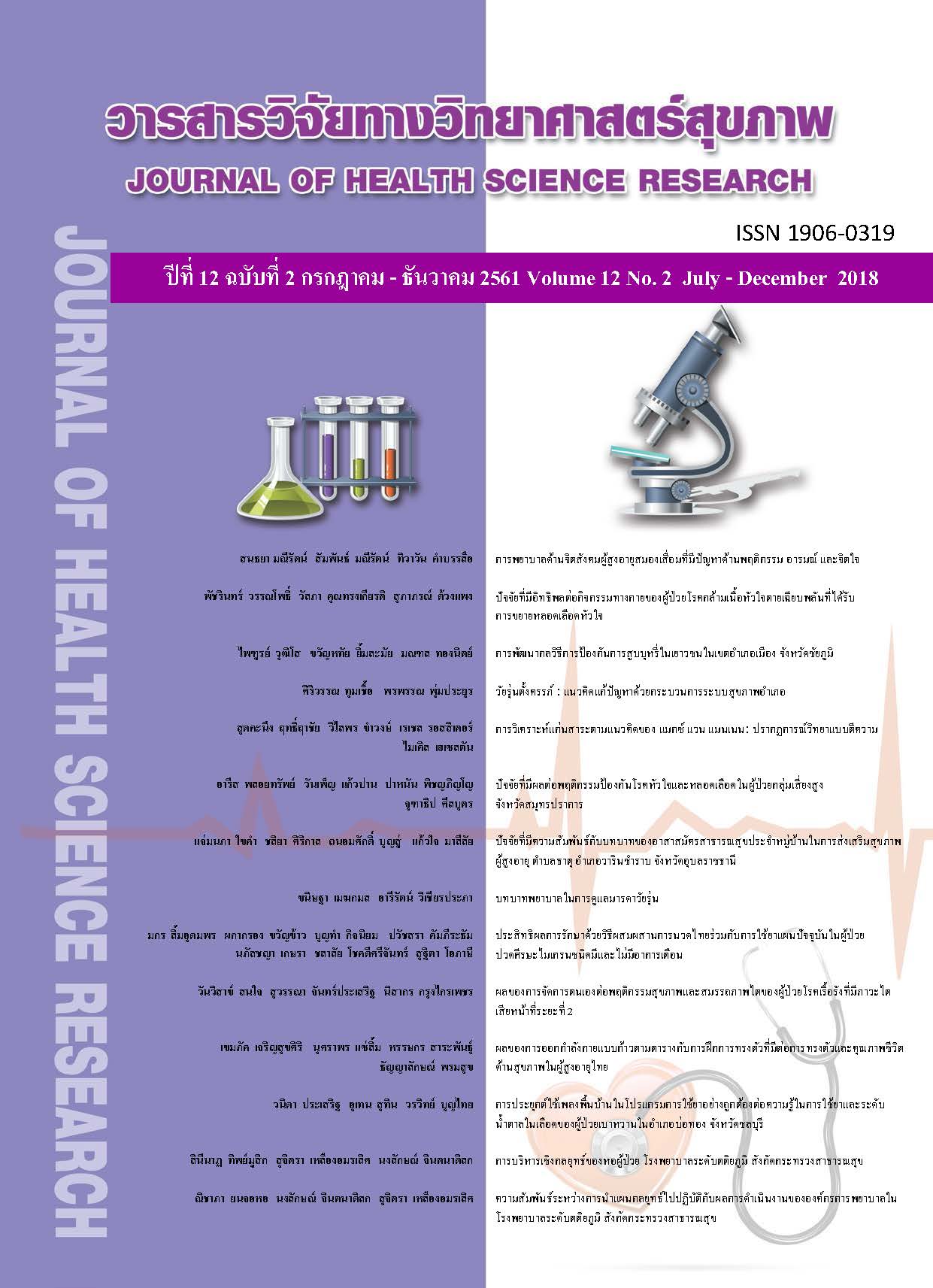การพยาบาลด้านจิตสังคมผู้สูงอายุสมองเสื่อมที่มีปัญหาด้านพฤติกรรม อารมณ์ และจิตใจ
Main Article Content
บทคัดย่อ
ปัญหาพฤติกรรม อารมณ์ และจิตใจ (Behavioral and psychological symptoms of dementia: BPSD) เป็นปัญหาที่พบได้บ่อยในทุกระยะของผู้สูงอายุที่มีภาวะสมองเสื่อม และเป็นสาเหตุที่ทำให้ผู้ป่วยเข้ารับการรักษาในโรงพยาบาลมากกว่าปัญหาจากสมองเสื่อม พฤติกรรมเหล่านี้ไม่ได้เกิดจากความผิดปกติจากการทำงานของสมองโดยตรง แต่มีปัจจัยที่เป็นสาเหตุการเกิดหลายด้าน ทั้งด้านชีวภาพ สิ่งแวดล้อม จากตัวผู้ป่วย ผู้ดูแล และผลข้างเคียงของยาที่รับประทาน ปัญหาที่พบบ่อยได้แก่ พฤติกรรมอยู่ไม่นิ่ง ก้าวร้าว กรีดร้อง เดินไปเดินมา มีพฤติกรรมซ้ำๆ มีหูแว่ว ภาพหลอน มีปัญหาการนอนหลับ และมีอารมณ์เฉยเมย เป็นต้น อย่างไรก็ตาม มีหลายการศึกษาที่มีหลักฐานเชิงประจักษ์ว่าการดูแลด้านสังคมจิตใจ ผู้สูงอายุสมองเสื่อมที่มีปัญหา BPSD โดยไม่ใช้ยา เป็นการรักษาทางเลือกที่มีหลักฐานเชิงประจักษ์ว่ามีประสิทธิภาพ และมีความปลอดภัยกับผู้สูงอายุโดยมีผลลัพธ์การรักษาในการช่วยลดและแก้ไขปัญหาพฤติกรรมบางอย่างได้ บทความฉบับนี้นำเสนอกิจกรรมด้านจิตสังคม ซึ่งเป็นส่วนหนึ่งของการศึกษา เรื่องการพัฒนารูปแบบการพยาบาลด้านจิตสังคมผู้สูงอายุที่มีภาวะสมองเสื่อม โดยมีผลการศึกษาว่าเป็นกิจกรรมที่สามารถนำไปใช้ เพื่อการลด และแก้ไขปัญหาด้านพฤติกรรม อารมณ์ และจิตใจในผู้สูงอายุที่มีภาวะสมองเสื่อมควบคู่ไปกับการรักษาโดยการใช้ยาได้ กิจกรรม ประกอบด้วย 1) การออกกำลังกาย 2) การปลูกต้นไม้ ดอกไม้ 3) การบริหารสมอง 4) การกระตุ้นการรับรู้ตามจริง และ 5) การกระตุ้นประสาทสัมผัส ดังนั้น พยาบาลซึ่งเป็นผู้ที่มีบทบาทสำคัญในดูแลผู้สูงอายุสมองเสื่อมที่มีปัญหาพฤติกรรม อารมณ์ และจิตใจ จึงควรให้การดูแลที่ครอบคลุมตั้งแต่การประเมิน วินิจฉัย การวางแผน การให้การพยาบาล และการประเมินผล รวมถึงบทบาทในการสอนญาติ เพื่อให้สามารถนำกิจกรรมไปใช้ในการดูแลผู้ป่วยขณะอยู่ที่บ้านได้อย่างมีคุณภาพ และลดผลกระทบต่อการเกิดปัญหาด้านอื่นๆ ต่อไป
Downloads
Article Details
บทความที่ได้รับการตีพิมพ์เป็นลิขสิทธิ์ของวิทยาลัยพยาบาลบรมราชชนนี จังหวัดนนทบุรี
ข้อความที่ปรากฏในบทความแต่ละเรื่องในวารสารวิชาการเล่มนี้เป็นความคิดเห็นส่วนตัวของผู้เขียนแต่ละท่านไม่เกี่ยวข้องกับวิทยาลัยพยาบาลบรมราชชนนี จังหวัดนนทบุรี และคณาจารย์ท่านอื่น ในวิทยาลัยฯ แต่อย่างใด ความรับผิดชอบองค์ประกอบทั้งหมดของบทความแต่ละเรื่องเป็นของผู้เขียนแต่ละท่าน หากมีความผิดพลาดใด ๆ ผู้เขียนแต่ละท่านจะรับผิดชอบบทความของตนเองแต่ผู้เดียว
เอกสารอ้างอิง
2.Phanasathit M, Charernboon T, Hemrungrojn S, Tangwongchai S, Phanthumchinda K. Prevalence of Neuropsychiatric symptoms in mild cognitive impairment and Alzheimer’s disease. In: Mateos R, Engedal K, FrancoM, eds. IPA 2010 Diversity, Collaboration, Dignity. Poster session presented at: The IPA International Meeting. Santiago de Compostela: Universidade de Santiago de Compostela; p. 491-2. (in Thai).
3.O’Donnell BF, Drachman DA, Barnes HJ, Peterson KE, Swearer JM, Lew RA. Incontinence and troublesome behaviors predict institutionalization indementia. J Geriatr Psychiatry Neurol. 1992;5(1):45-52.
4.Rosdinom R, Zarina MZ, Zanariah MS, Marhani M, Suzaily W. Behavioural and psychological symptoms of dementia, cognitive impairment and caregiver burden in patients with dementia. Prev Med. 2013;57 Suppl:67-9.
5.Overshott R, Burns A. Non-phamacological treatment of severe dementia: An overview. In: Burns A, Winblad B, ed. Severe dementia. West Sussex, UK: John Wiley & Sons; 2006. p.162-75.
6. Sittironnarit G. Behavioral and Psychological Symptoms of Dementia (BPSD): Concept and treatment. Journal of the Psychiatric Association of Thailand. 2011;56(4):449-62. (in Thai).
7. KM Center of Neuropsychological Ward, Somdet Chaopraya Institute of Psychiatry. Memory training program for dementia with BPSD [Internet]. 2001 [cited 2018 Jun 28]; Available from: http://mhtech.dmh.go.th/ec/somdet/show_klb_details.php?id_klb=KL00000051. (in Thai).
8. Maneerat S, Boonchai S. Development of a psychosocial nursing care model for elderly with dementia in Suansaranrom Psychiatric Hospital. Princes of Naradriwas University Journal of Humanities and Social Sciences. 2015;2(1):52-62. (in Thai).
9.Spijker A, Verhey F, Graff M, Grol R, Adang E, Wollersheim H, et al. Systematic care for caregivers of people with dementia in the ambulatory mental health service: designing a multicentre, cluster, randomized, controlled trial. BMC Geriatr. 2009;9:21.
10.Guze SB. Diagnostic and statistical manual of mental disorders. 4thed. Washington, DC: American Psychiatric Association; 1994.
11.Maneerat S. Prevalence symptoms and factors related to BPSD of elderly with dementia who accessed the elderly clinic of Suansaranrom Psychiatric Hospital [Internet]. 2012 [cited 2018 May 15; Available from: http://www.klb.dmh.go.th. (in Thai).
12.Zaudig M. A risk-benefit assessment of risperidone for the treatment of behavioral and psychological symptoms in dementia. Drug Saf. 2000;23(3):183-95.
13.Dementia Australia. Physical exercise and dementia [Internet]. 2015 [cited 2018 May 19]; Available from: https://www.dementia.org.au/files/helpsheets/Helpsheet-DementiaQandA08-PhysicalExercise_english.pdf.
14.Beckwith ME, Gilster SD. The paradise garden: A model garden design for those with Alzheimer's disease. Act Adapt Aging. 1997;22(1-2):3-16.
15.Mooney P, Nicell PL. The importance of exterior environment for Alzheimer's residents: Effective care and risk management. Healthc Manage Forum. 1992;5(2):23-9.
16.Lana. Sensory stimulation ideas for people living with dementia [Internet]. 2017 [cited 2018 Jun 8]; Available from: https://www.access-care.co.uk/single-post/2017/ 05/30/Sensory-Stimulation-Activities-for-dementia.


